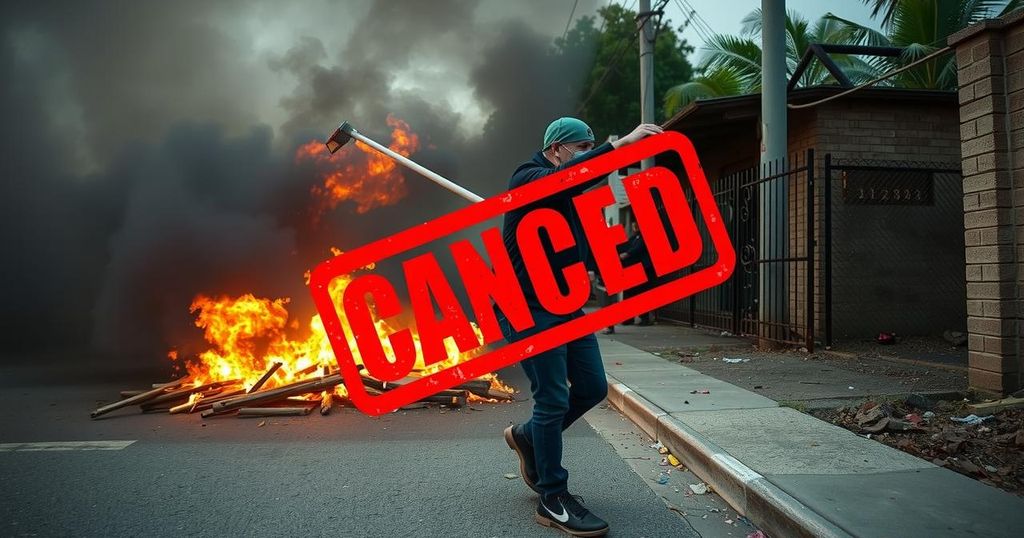Comoros has declared a week of national mourning following Cyclone Chido’s devastation in Mayotte, which has resulted in severe casualties and infrastructure damage. President Azali Assoumani’s announcement reflects the gravity of the disaster, which has disproportionately affected the Comoran community in Mayotte. The cyclone, categorized as a level four storm, has led to a humanitarian need for rescue operations and equitable aid distribution.
Comoros has officially launched a week of national mourning following the devastation caused by Cyclone Chido in neighboring Mayotte, which resulted in extensive casualties and damage in shantytowns where many Comorans reside. President Azali Assoumani announced that this period of mourning will continue until Sunday. Cyclone Chido, classified as a category four storm, struck Mayotte with winds exceeding 220 kilometers per hour, impacting an island where approximately half of its 320,000 residents are from Comoros.
This cyclone is recorded as the most severe to affect Mayotte in nearly a century. Eyewitness reports indicate that shantytowns have been flattened, suggesting a high number of victims. The systematic issue of undocumented migration exacerbates the situation, as many individuals fear approaching accommodation centers prior to the cyclone, fearing identification and deportation. Reports suggest that between 100,000 to 200,000 undocumented migrants currently reside on the island.
In the aftermath, France has mobilized ships and military aircraft to deliver rescue workers and necessary supplies. Essential services such as electricity and communication have been disrupted, leading to concerns over a lack of drinking water and food shortages. Senator Salama Ramia emphasized the dire conditions for many in shelters, highlighting the urgent need for aid. Mayotte, considered the poorest locality within the European Union, is home to a high-density population predominantly of Muslim faith.
Prefect François-Xavier Bieuville stated that the death toll could potentially reach several hundred or even thousands; however, the precise accounting of losses may prove difficult due to cultural practices surrounding burial. Rescue operations are being coordinated from the mainland, as the damage is extensive and renders many areas inaccessible.
The current conditions pose a significant humanitarian challenge, necessitating immediate aid and long-term rebuilding initiatives to support the affected population.
Cyclone Chido has emerged as one of the most devastating natural disasters to strike the Indian Ocean archipelago of Mayotte, which is a territory of France. It severely impacted shantytowns, predominantly inhabited by Comorans, who have long faced socio-economic challenges and migration pressures. The geographical proximity of Comoros and Mayotte complicates the humanitarian response. The cyclone’s intensity and the resulting damage reflect the vulnerable status of Mayotte, where many inhabitants live in makeshift housing and rely on informal economies. Furthermore, the socio-political relations between Comoros and France, stemming from Mayotte’s decision to remain a French territory, intensify the existing challenges of undocumented immigration and emergency responses during disasters. The cultural and population dynamics of the region further complicate efforts to deliver aid and accurately assess the extent of the disaster’s impact.
In summation, the aftermath of Cyclone Chido in Mayotte has resulted in profound humanitarian distress, marked by significant loss of life and infrastructure. The decision by Comoros to observe a week of mourning underscores the severity of the calamity affecting both Comoros and Mayotte. The challenges associated with undocumented migration, coupled with cultural traditions regarding death, complicate the recovery process. Immediate assistance from France and other territories is critical to addressing the pressing needs of the affected populations. Long-term recovery and rebuilding will require coordinated efforts to improve infrastructure and living conditions in this vulnerable region.
Original Source: www.arabnews.com






